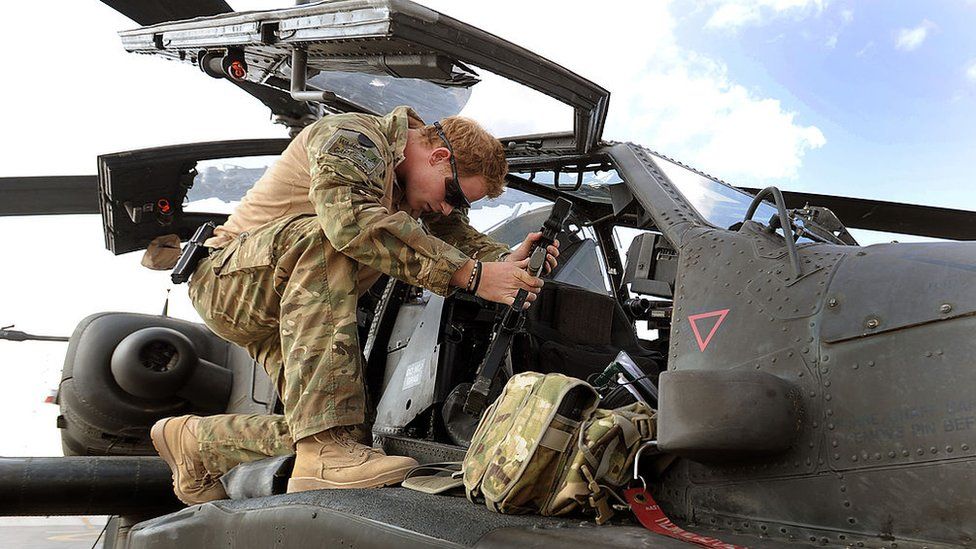Prince Harry has tarnished his reputation with remarks about killing Taliban fighters in Afghanistan, a former British commander says.
In his memoir, the Duke of Sussex describes his 25 kills as “chess pieces removed from the board”.
Ex-army officer colonel Richard Kemp told the BBC Harry’s comments were “ill-judged”.
He added the remarks may have undermined his security and could provoke people to take revenge.
Prince Harry gives details about his time as a helicopter pilot in Afghanistan in his memoir Spare, which BBC News has obtained a copy of after it was put on sale early in Spain.
In it, he reveals for the first time that he killed 25 enemy fighters – which is perfectly possible after two tours in the Helmand region of the country.
“It wasn’t a statistic that filled me with pride but nor did it leave me ashamed,” he writes.
“When I found myself plunged in the heat and confusion of combat I didn’t think of those 25 as people. They were chess pieces removed from the board. Bad people eliminated before they could kill good people.”
Harry briefly served as a forward air controller on the ground calling in strikes, before flying Apache helicopters in his second longer tour.
Responding to the prince’s comments, Taliban spokesman Bilal Karami accused the forces of countries who once fought in Afghanistan of “committing crimes”. He said: “This confession shows that the forces of all occupying countries have the same criminal stories.”
The US and its Nato allies invaded in October 2001 to oust the Taliban, whom they said were harbouring Osama Bin Laden and other al-Qaeda figures linked to the 9/11 attacks.
Col Kemp, who was sent to Kabul in 2003 to take command of forces in Afghanistan, said the Taliban insurgents killed were bad people and he did not have a problem with Prince Harry revealing his kill number – but took issue with the way Harry suggested Taliban insurgents were seen by the army as “sub-human and just as chess pieces to be knocked over”.
He told BBC Breakfast: “I think he’s wrong when he says in his book that insurgents were seen just as being virtually unhuman – subhuman perhaps – just as chess pieces to be knocked over.
“That’s not the case at all. And it’s not the way the British Army trains people as he claims…
“I think that sort of comment that doesn’t reflect reality, is misleading and potentially valuable to those people who wish the British forces and British government harm, so I think it was an error of judgement.”
In Harry’s defence, he said the prince should be “proud” of his kill number due to the “effective impact” it would have had on the campaign, his courage in action, and for the way he has championed wounded soldiers.
But he said it could worsen the duke’s security problems and could cause people who sympathise with the Taliban to be “provoked to attempt revenge”.
“It inflames old feelings of revenge that might have been forgotten about… no doubt about it there are people in the world today who already would have seen this and will be thinking about getting him back,” he added.
Retired commanding officer colonel Tim Collins, who gained worldwide fame for an eve-of-battle speech to troops in Iraq, condemned the book saying, “that’s not how you behave in the army, it’s not how we think”.
He also accused Prince Harry of “turning against” his military family after “having trashed his birth family”.
Adam Holloway, the Conservative MP for Gravesham who fought in Iraq for the British Army, wrote in the Spectator that many soldiers did not think it was appropriate to publicise their kill count.
“It’s not about macho codes. It’s about decency and respect for the lives you have taken,” he wrote.
Another serviceman still serving told the BBC Harry’s comments were “very unsoldier-like”.
The soldier, who’s done several tours of Afghanistan, said he would struggle to work out how many ‘kills’ he had been directly involved in – without access to all the specific patrol reports. Lots of people firing roughly in the same direction would make it harder to tell too.
And like many military personnel, he said he had no interest in keeping count. More often it is those who write books who seem to take more of an interest in their kill statistics.
Harry in his role as a helicopter pilot would have had a better view than most from his cockpit – seeing individuals up close using sensors and screens.
He would also see the impact of his cannon and hellfire missiles – although clarity would be soon obscured by dust – and he would be able to review footage from the cockpit. But it is not always possible to count bodies on the ground or to distinguish between someone injured or killed.
Prime Minister Rishi Sunak said he would not comment on the appropriateness of the prince’s 25 kills claim, but added he was “enormously grateful to our armed forces”.
A Ministry of Defence spokesperson, when asked about the prince’s kill number, said: “We do not comment on operational details for security reasons.”
Source: BBC




















































